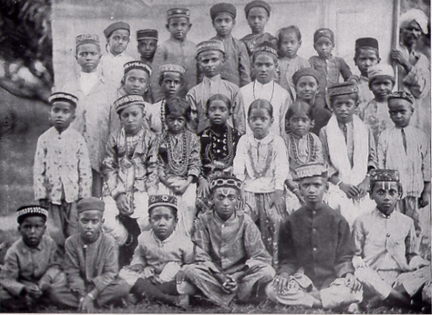
Some pupils of the Methodist Episcopal Day School, Bangalore, South India. The boy’s school has 80, the girl’s school has 50 pupils.
[Note: the following excerpt is from an extraordinary article in the National Geographic Magazine in December, 1910, written some 99 years ago. Time has moved on and the names of the principal players may have changed, but the refrain remains the same.]
Race Prejudice in the Far East
by Melville E. Stone, December, 1910
Although whole libraries have been written concerning Asia and the Asians, there is a widespread belief that, because of the differences in our mentalities, it is not possible for us ever to understand them, or they us. Kipling says that “East is East, and West is West, and never the twain shall meet.” The “oldest inhabitant” in India or China or Japan is sure to tell you that the Oriental mind is unfathomable. I have not the temerity to challenge these opinions. And yet I venture to suggest that there is an older authority holding a different view, and that I still have some respect for Cicero’s idea that there is a “common bond” uniting all of the children of men.
And whatever our ignorance of, or indifference for, the Orientals in the past, it is well to note that conditions, both for us and for them, have entirely changed within the last decade. There is a new United States and a new Asia. The Spanish War created the one; the Russo-Japanese War the other. When we acquired the Philippine Islands we assumed the government of eight millions of Orientals and touched elbow with all Asia. When Japan defeated Russia, the Oriental learned his power. For untold centuries he had respected power. His native sovereign was an autocrat, who enslaved him, beat him, killed him, if need be. then came the Europeans, with powder and guns and warships; and thereafter the white man behind the gun represented power. A handful of British with cannon could enforce obedience from hundreds of millions of people. Suddenly the little Empire of Japan, one of the least among the Asiatic powers, challenged, fought, and defeated the great European Colossus, Russia.
The Asian discovered that it was not the white man, but the gun that did the business; he learned that a yellow man behind the gun was quite as effective as a white man and he found that the Christian soldier alone was afraid of death. Then followed in travail the birth of the new Asia. There were actual revolutions in Turkey and Persia, a startling recrudescence of unrest in India and Ceylon, and, at this moment, China is in a state of revolutionary ferment.
What is to be the outcome? What does all this mean for the future of the world? Let us view the problem from the political, the commercial, and the moral aspects. How long will the 6,000 soldiers we have in the Philippines be able to keep our flag afloat among 8,000,000 of natives? How long will the 25,000 English soldiers in India be able to maintain British sovereignty over 300,000,000 of Asians? Believe me, these are not idle questions. They are up to us for an answer, whether we will or no and upon our ability to make answer will depend the future of what we are pleased to call our Western civilization. I would not be an alarmist, and yet I would have you feel that Macaulay’s suggestion of the New Zealander on a broken arch of London Bridge, sketching the ruins of St. Paul, has come to be more than an extravagant figure of speech.
An I am convinced that there is real danger awaiting us unless we mend our ways. It is not the Asian who needs educating; it is the European. I am not worrying half so much about the heathen in his blindness as I am about the Christian in his blindness…
It will not due for us to assume that ours is the only civilization. What are the basic virtues, the sum of which we call our Christian civilization? I hope we are all agreed that they are not primarily beliefs in certain theological dogmas, or certain forms of church polity, or in the shape or length of priestly vestments, but in the attributes of correct Christian living. Is frugality a virtue? Your Asian far exceeds us in frugality. Is industry a virtue? No people on earth work as long, as persistently, and as conscientiously as they. Is integrity esteemed? It is the unchallenged judgment of every European writer that the word of an Asian was good until they were corrupted by the inroads of Westerners. Is politeness, which is but another name for the golden rule, to be commended? Nowhere will you find politeness as is daily and hourly observed east of Suez.
Excerpt from Melville E. Stone, “Race Prejudice in the Far East,” National Geographic Magazine 21(12):973,95, 977.